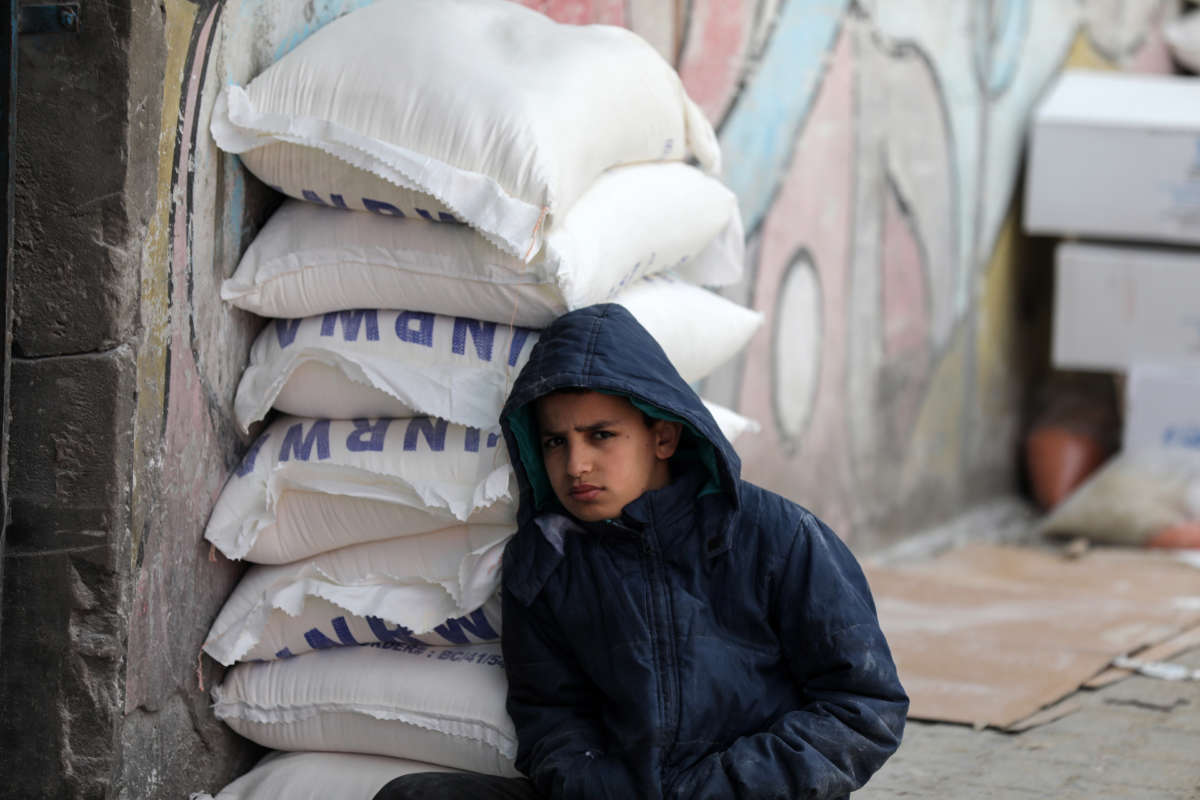Did you know that Truthout is a nonprofit and independently funded by readers like you? If you value what we do, please support our work with a donation.
The humanitarian group Oxfam International warned Monday that wheat flour reserves in the occupied Palestinian territories could run out within the next three weeks as Russia’s assault on Ukraine continues, pushing prices to all-time highs and throwing the global grain market into chaos.
Prior to the war, Russia and Ukraine together supplied nearly 30% of the world’s wheat, with a large portion of its exports going to the Middle East.
The Palestinian Authority, which governs part of the Israeli-occupied West Bank, imports around 95% of its wheat, according to Oxfam. Israel, which often throttles the occupied territories’ trading and restricts their agricultural development, imports half of its grain and cereals from Ukraine.
If Russia’s war on Ukraine continues, Oxfam noted, experts believe the Palestinian territories’ diminishing wheat stocks could be exhausted in two to three weeks.
“Palestinian households are being hit hard by rising global food prices, and many are struggling to meet their basic needs,” said Shane Stevenson, Oxfam’s country director in the occupied Palestinian territories and Israel. “The reliance on imports and the constraints forced upon them by Israel’s continuing military occupation, settler violence, and land grabs are compounding the food crisis.”
Most households in the #Gaza Strip are now buying food on credit. Many families are eating less and lower quality of food items. Families are cutting out more expensive food such as fruit, meat and chicken that are necessary for a healthy diet.
More: https://t.co/tTHVXAmIDq— Oxfam International (@Oxfam) April 11, 2022
Oxfam reported that food insecurity across the Palestinian territories has jumped to 31.2%, and roughly 2.1 million people there will require humanitarian assistance this year.
To prevent the hunger crisis in the territories from intensifying, Oxfam called on the international community to “urgently adopt a common and coordinated economic and diplomatic position that challenges Israel’s restrictive policies and allows Palestinians to invest in local food production and infrastructure.”
“Every day we meet people who are searching for jobs and money just to feed their children. We feel very stuck at this stage,” Najla Shawa, Oxfam’s head of food security in Gaza, said in a statement Monday. “How can we draw attention from the international community to the deteriorating socio-economic situation in Gaza?”
“Our work in Gaza is becoming increasingly challenging,” Shawa added. “It is difficult to describe the true level of damage that all this is causing on people’s lives — it is devastating.”
Last week, the U.N. Food and Agriculture Organization (FAO) said that global food prices soared to record levels in March, driven by the rising costs of cereals and vegetable oils. Ukraine is the world’s largest exporter of sunflower oil.
Price surges and war-induced supply chain disruptions are endangering the food supply of millions of people in Yemen and other nations ravaged by years of military conflict.
The World Food Programme, which purchases half of its grain from Ukraine, noted in March that “imports from Ukraine account for 31% of the wheat arriving in Yemen in the past three months — prices are suddenly seven times higher than they were in 2015.”
Speaking against the authoritarian crackdown
In the midst of a nationwide attack on civil liberties, Truthout urgently needs your help.
Journalism is a critical tool in the fight against Trump and his extremist agenda. The right wing knows this — that’s why they’ve taken over many legacy media publications.
But we won’t let truth be replaced by propaganda. As the Trump administration works to silence dissent, please support nonprofit independent journalism. Truthout is almost entirely funded by individual giving, so a one-time or monthly donation goes a long way. Click below to sustain our work.
